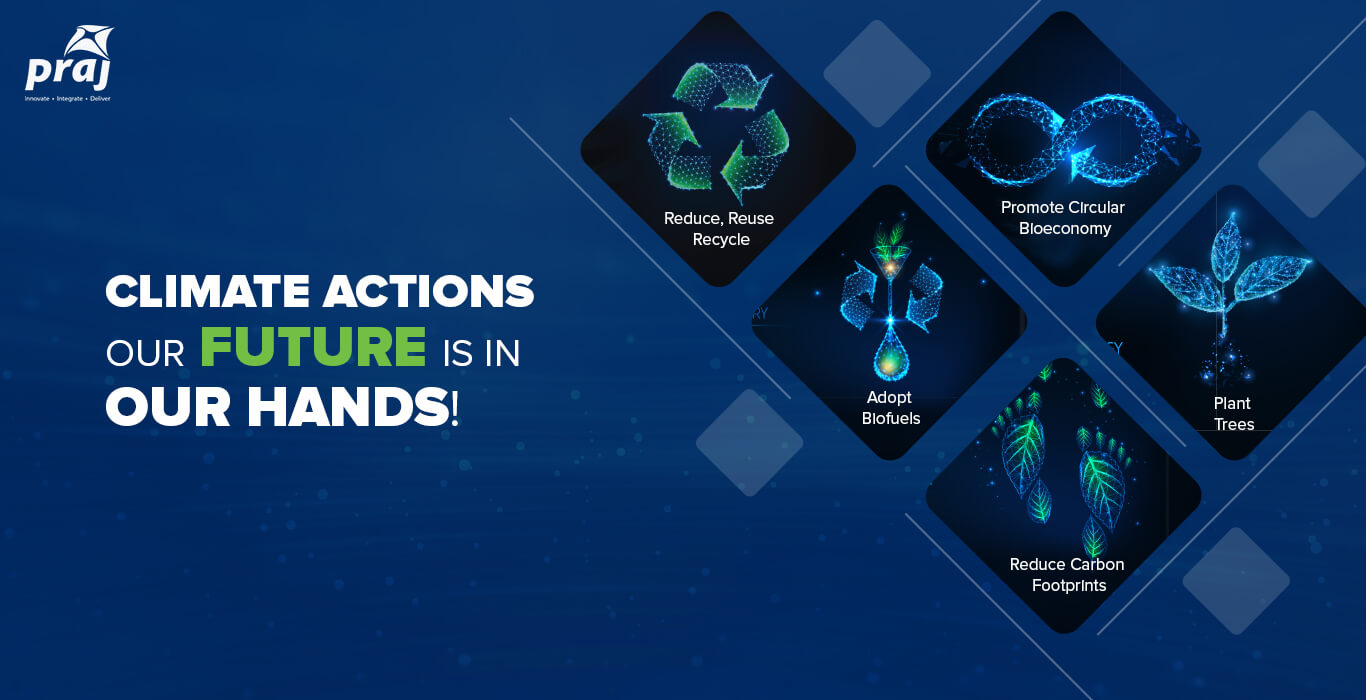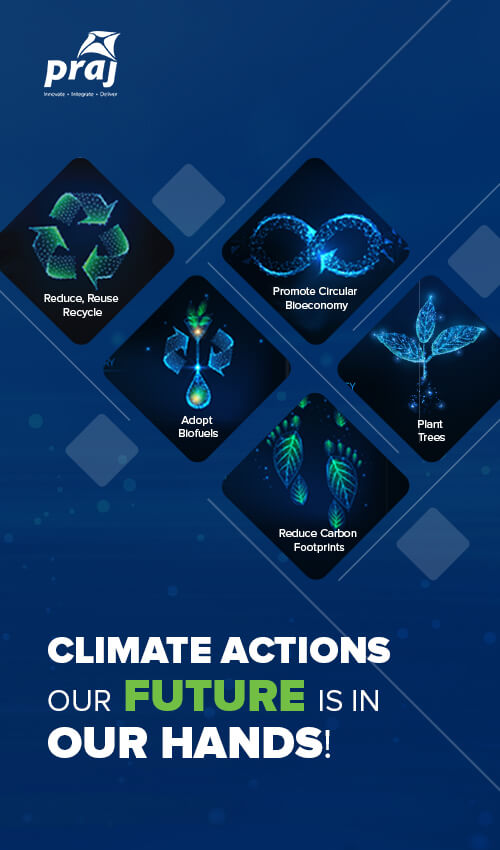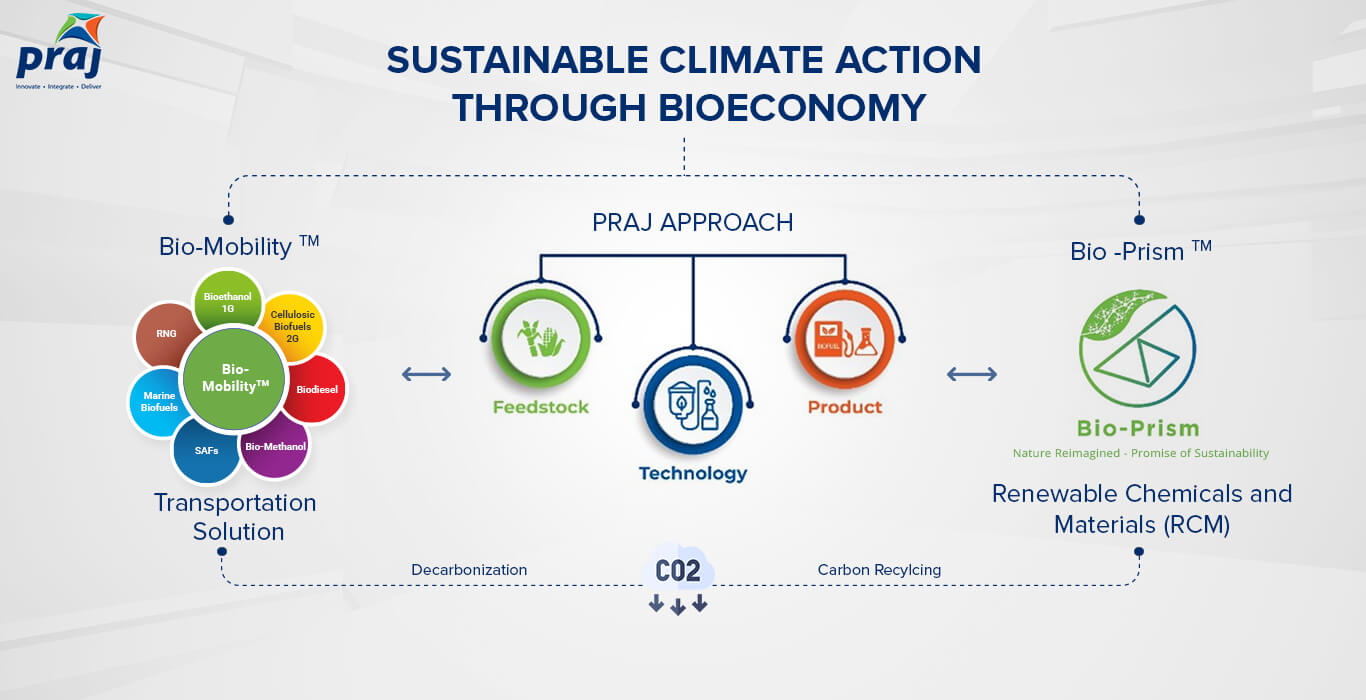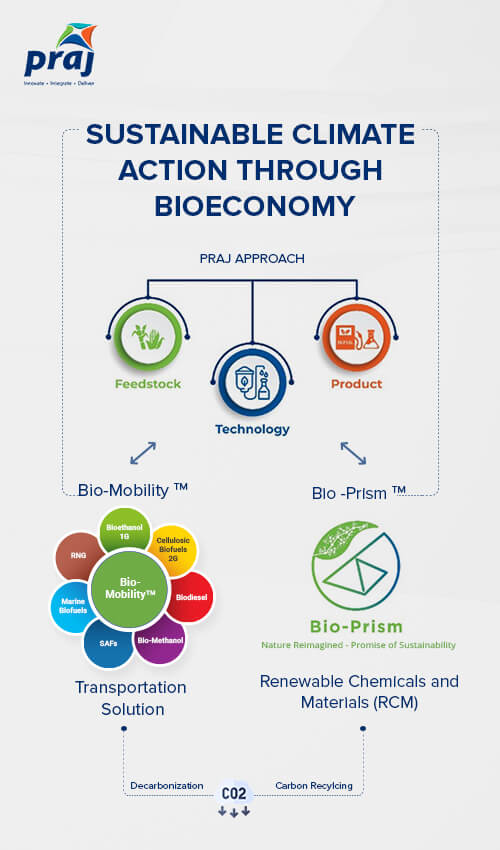Modular Process Skids
Praj is one stop solution for Modularization of Process Plants offering solutions from concept to commissioning.
We have expertise in developing modular solutions for various process plants and new process technologies.
Being a Technology & Engineering company, Praj is uniquely positioned to provide unique solutions by leveraging and integrating in-house competencies like:
- Process understanding
- Multi-disciplinary Engineering
- Centralized Global Procurement
- Manufacturing of Process Plant Equipment and Modules
- Module Assembly yard
- Global Experience of logistics
- Expertise in installation of plants in all continents (Stick-built and Modular)

Major steps involved in Modularization are:
- Basic Engineering Package : PFD, P & ID , Equipment & Line Sizing
- Conceptualization of Modular Configuration considering : Space availability / Process operation / Maintenance / HSE / Transportability
- Structural layout
- Piping Layout /isometrics
- Electric & Instrumentation Layouts and routing
- Structural and Piping prefabrication and assembly
- Procurement
- Static Equipment Manufacturing
- Installation : Equipment / piping / Field Instruments / Electricals
- Routing of cables , Installation of junction Box , MCC , PLC Panels
- Factory Acceptance Test
- Insulation & Cladding of equipment and piping
- Packing & Dispatch
Benefits of Modularization:
| Areas | Benefits | Savings potential |
|---|---|---|
| Plant Design / Engineering | Transportable Design Smaller Footprint | 20-30% Footprint savings possible |
| Procurement / Inbound Logistics | Reduction of procurement items and subsequent logistics for EPC / End-client | Savings in co-ordination efforts and consequently man-hours |
| Manufacturing / Assembly | Safer conditions than site Controlled assembly and QA FAT before installation | Site labour cost saving from 25 to 75 % possible depending on site |
| Overall Schedule | Faster Installation at Site Minimizing and controlling risk during construction Accelerated schedule Faster start of production | 25 to 30% compressed schedule possible |
Modular Fabrication:
Praj has state of the art manufacturing facility at Kandla, Gujarat. Facility is in special economic zone and close to Kandla Port and Mundra port.
The facility has dedicated fabrications shops for Structure fabrication, SS & CS Piping Fabrication, Blasting & Paining facility, Module assembly shop and Module assembly open yard.
Types of Modularizations:
| Type | Units | General Size | In the Shop / Yard | Transportation | At Site |
|---|---|---|---|---|---|
| Type 1 | Single Process Unit | Containerized / Trackable | Complete assembly and Pre-Comm | As a Single Unit | Plug and Play |
| Type 2 | Process Package | Process Package Transportable by road (Containerized/ Trackable ) |
Complete Assembly, Pre-comm and Dismantling of individual units | In multiple units and spools of inter-connecting piping | Assembly of units + Spools ( Lego ) |
| Type 3 | Process Package | Very Large Difficult to transport by road | Complete assembly and Pre-Comm | As a Single Unit – Generally by barge/ ship | Very large cranes |
Praj specializes in conceptualizing, designing, and building Type 1 & Type 2 Modular Plants for various process packages. This mainly includes PARs, PAUs, Pre-Dressed Vessels / Columns and Pre-assemblies. Modules can be horizontal, Vertical or combination of both.
Centre of Excellence for Modularization :
Praj Centre of Excellence for Modularization offers most appropriate modularization solutions to customers. CoE is a team of experts with rich experience from different functions and focused to bring innovative and creative ideas to develop the best modular solutions for our customer.
Modular solutions provided by Praj are uniquely developed by considering various aspects like optimum footprint, optimum usage of materials, safety rules and regulations, Manufacturing feasibility, Logistics feasibility, Maintenance feasibility, reduction of site activity and ease of assembly at site, cost competitive.
Praj CoE is committed to provide best in class modular solutions to our customer and continual efforts to contribute in Praj’s sustainability journey.
Oil & gas separation 2/3 phases

2 & 3 phase separators remove liquids from natural gas. Vertical separators are ideal in case of space constraints at the well site or gathering station whereas horizontal separators are suitable for large quantities of liquids.Gas-liquid separation parameters vary from one well to another.
Praj has the right equipment to fit your diverse needs. We offer top quality 2 & 3 phase separators in horizontal and vertical designs that can be configured for both low and high-pressure applications.
Gas sweetening – H2S and CO2 removal

Praj offers amine plants for the removal of H2 Sand CO2 from a gas stream. The solvent amine is provided in different specifications depending on the type of contaminant to be removed. Equipment are delivered, packaged and modularized with a view to reduce costs of assembly and installation.
Dehydration – glycol/molecular sieves
Molecular sieve dehydration units provide an effective means to remove water from a natural gas stream.Praj offers monoethylene glycol (MEG) modules used by the gas dew point adjustment process to prevent formation of hydrates and clogging of the equipment. This procedure includes - regeneration module, degassing flash separator, filters for removal of hydrocarbons and solids particles, regeneration module and heat exchanger where the MEG transfer is cooled and serves to feed the pump suction. Thus, a water-poor high-pressure glycol stream is delivered to the skid edge, reinjected into the gas treatment plant closing the circuit. Praj also offers triethylene glycol (TEG) modules for the removal of water in natural gas prior to being sent to a pipeline or entrance of a gas plant. This absorption process is preferably carried out at high pressure and is given inside a tower which allows the water vapor to be absorbed by the liquid TEG. It is then sent to a regeneration module.
Gas conditioning
The design approach is based on process simulation to determine the condensing temperature, hydrate formation temperature, water and constituent dew point before deciding the individual stages of cleaning and conditioning.
Gas conditioning process has 2/3 stages
-

Particulate removal– dust, contaminants, rust and slug from pipelines is removed by mechanical separation and filtration
-

Removal of condensables- handling of water and other condensing constituents
-

Provision to superheat or dew point depression

Dew point adjustment
Praj offers dew point adjustment plants for gas is conditioning so it meets the pipeline transportation specifications. This process increases removes the heaviest components, improving the quality and value. The conditioned gas at its dew point improves the detonation point and allows its use as fuel efficiently in engines, turbines, ovens and boilers. This adjustment can be achieved by the Joule-Thompson effect or by mechanical cooling.
Praj also offers and has commendable references in modularisation of chemical plants and industrial gas systems.
Engineered Products

Heaters
Heater is used to heat fuel gas at power generation plants, compressor stations, and wellheads.Gas is heated before its pressure is reduced. Heating fuel gas while it is still at a highpressure prevents ice crystals and hydrates formation in the lines when its pressure is reduced for combustion. Ice and hydrates can cause major damage to the gas-fired turbines and other equipment.
Heater is also required to heat crude oil at offshore platforms and refineries. Oil is heated to reduce viscosity for easy pumping.
Praj designs a range of heaters and provides skateboard mounted heaters with combustion frame and associated pipes.
We offer-- Carbon steel – all grades, including NACE, SSC, HIC
- Alloy steel – various grades & combination of Cr, Ni, Mo, Ti etc
- Non ferrous – Cu, Ni, Brass, Co, Ti and their alloys
- Stainless steel – Austenitic, Ferritic, Duplex and Super Duplex
- Clad steel – CS and LAS with Cu-Ni, Monel, Inconel, SS, Ti, Ni cladding
Flaring Systems
Following factors determine an efficient flare design –

Following factors determine an efficient flare design –

Drilling Fluid Products

In collaboration with VEW Engineering, Praj offers liquid mud plants (PV LiquimudTM) in mixing, storing and reconditioning of drilling fluids for oil and gas exploration. We supply skid mounted mixing tank assembly, a plurality of nestable tanks and entire piping assembly. PV LiquimudTM is the most reliable product for the exploration industry in terms of design and quality standards.
- Designand manufacturing in compliance with ISO and global standards
- Global references with country specific compliances like GOST R, UkrSEPRRO, AS, CRN, DOSH, MOM etc
- State of art manufacturing facility at Kandla SEZ, well connected by roads and international ports
- Fabrication expertise in almost all grades of carbon and stainless steel with inner lining requirement as specified
- Well established quality standards and assurance system
Oil & gas separation 2/3 phases

2 & 3 phase separators remove liquids from natural gas. Vertical separators are ideal in case of space constraints at the well site or gathering station whereas horizontal separators are suitable for large quantities of liquids.Gas-liquid separation parameters vary from one well to another.
Praj has the right equipment to fit your diverse needs. We offer top quality 2 & 3 phase separators in horizontal and vertical designs that can be configured for both low and high-pressure applications.
Gas sweetening – H2S and CO2 removal

Praj offers amine plants for the removal of H2 Sand CO2 from a gas stream. The solvent amine is provided in different specifications depending on the type of contaminant to be removed. Equipment are delivered, packaged and modularized with a view to reduce costs of assembly and installation.
Dehydration – glycol/molecular sieves
Molecular sieve dehydration units provide an effective means to remove water from a natural gas stream.Praj offers monoethylene glycol (MEG) modules used by the gas dew point adjustment process to prevent formation of hydrates and clogging of the equipment. This procedure includes - regeneration module, degassing flash separator, filters for removal of hydrocarbons and solids particles, regeneration module and heat exchanger where the MEG transfer is cooled and serves to feed the pump suction. Thus, a water-poor high-pressure glycol stream is delivered to the skid edge, reinjected into the gas treatment plant closing the circuit. Praj also offers triethylene glycol (TEG) modules for the removal of water in natural gas prior to being sent to a pipeline or entrance of a gas plant. This absorption process is preferably carried out at high pressure and is given inside a tower which allows the water vapor to be absorbed by the liquid TEG. It is then sent to a regeneration module.
Gas conditioning
The design approach is based on process simulation to determine the condensing temperature, hydrate formation temperature, water and constituent dew point before deciding the individual stages of cleaning and conditioning.
Gas conditioning process has 2/3 stages
-

Particulate removal– dust, contaminants, rust and slug from pipelines is removed by mechanical separation and filtration
-

Removal of condensables- handling of water and other condensing constituents
-

Provision to superheat or dew point depression

Dew point adjustment
Praj offers dew point adjustment plants for gas is conditioning so it meets the pipeline transportation specifications. This process increases removes the heaviest components, improving the quality and value. The conditioned gas at its dew point improves the detonation point and allows its use as fuel efficiently in engines, turbines, ovens and boilers. This adjustment can be achieved by the Joule-Thompson effect or by mechanical cooling.
Praj also offers and has commendable references in modularisation of chemical plants and industrial gas systems.







































